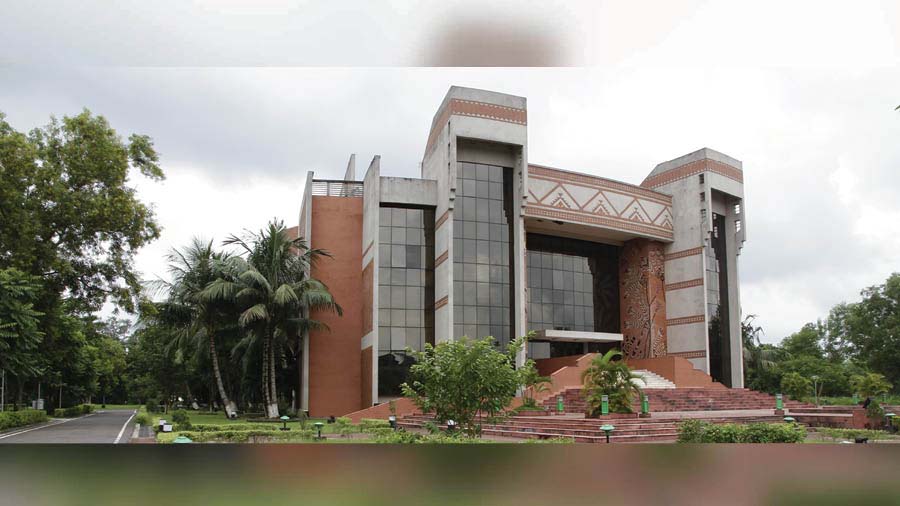Saikat Maitra and Manish Kumar Thakur from the Public Policy and Management Group, IIM Calcutta in collaboration with the Max Weber Forum for South Asian Studies and the School of Education, University of Glasgow, had organised a Conference on ‘Reimagining the Contemporary in Indian Education’ in the IIM-C premises from April 21-23, 2023 under the ESRC (UK) funded ‘Gendered Journeys’ project.
The conference aimed at comprehending the realities in Indian education in correlation with the New Education Policy (NEP) 2020 and identifying the graded inequalities that lie in the essence of Indian education today.
The conference began on April 21 with the keynote lecture by Gopal Guru, former faculty of Jawaharlal Nehru University (JNU) and editor of Economic and Political Weekly, with Srabani Maitra from the University of Glasgow as the chair. Guru spoke about the educational asymmetries that need to be addressed on a daily basis.
The first academic session started on April 22 with Debaditya Bhattacharya from the Kazi Nazrul University as the discussant. It began with a presentation by Prof. Shilpi Shikha Phukan who analysed the Vidya Bharti schools in Assam through an ethnographic study and how, through their schooling and curriculum, they modulate certain ideological values into their pupils. The next paper by Gargi Gayan from KKHSOU focussed on the role of community in the context of National Education Policy (NEP) 2020.
The second academic session which had Debarati Bagchi from the Max Weber Foundation as the discussant, began with JNU Faculty Parimala Rao’s paper on the trajectory of history-writing in Indian pedagogic discourse.
Ankita Mookerjee from South Calcutta Girls’ College talked about the elitist bias of liberal arts and how to reframe a liberal arts curriculum which veers away from producing socio-technocrats. The last presenter of the session, Sayantan Dasgupta from Jadavpur University, spoke on the Comparative Literature model which has always emphasised many aspects in pedagogy that the NEP 2020 is now stressing on.
The final academic session of the day had two papers and Anirban Das from the CSSSC as the discussant. The first, by Manoj Kumar from Azim Premji University, examined the English-medium schools in Andhra Pradesh, Chhattisgarh, and Telangana, and tried to unearth the cultural processes that led to the growing demand for English education. The second paper, by Manish Jain of Ambedkar University focused on how the NEP 2020 redefines notions of citizenship and “belonging”, and posits the notion of a continuous, uninterrupted Indian civilization as the ‘Sanatan Bharat’.
The day ended with a presentation by the ‘Gendered Journeys’ Project team, featuring Srabani Maitra and Barbara Read from the University of Glasgow, and Saikat Maitra and Manish Thakur from IIM-C. Dr. Yamini Agarwal from the Max Weber Foundation was the discussant. The presentation, through an analysis of the existing data of the project, charted the precarious trajectories of female STEM students and graduates through higher education and into employment.
On the final day of the conference, the fourth academic session had Shibasish Chatterjee of Jadavpur University as the discussant, and began with a talk by prof. Manabi Majumdar, former faculty of the CSSSC. Majumdar talked about the attempts to erode the plurality of perspectives, rewrite Indian history, and blur the boundaries between the market and the state in education. The next presenter, Dr Yamini Agarwal from the Max Weber Foundation, delved into the educational situation of religious minorities in Post-colonial India.
The last academic session of the conference featured Debaditya Bhattacharya as the discussant, and consisted of two papers. The first, by Shivali Tukdeo of Indira Mahindra School of Education, elaborated on the correlation between Indian Education policies and the model of residential schools or ‘Ashram’ schools. The last paper of the session and of the conference was by Rajesh Bhattacharya of the IIM-C, who tried to decode the financial under text of the NEP 2020 and the politics behind its emphasis on ‘local’.
The last session of the conference was the valedictory lecture by Krishna Kumar, former director of the NCERT, chaired by Manabi Majumdar. The lecture started with critically analysing the various factors that shape our imagination of the ‘contemporary’ in education.
The conference ended with the vote of thanks on behalf of the organisers Saikat Maitra from IIM Calcutta.
